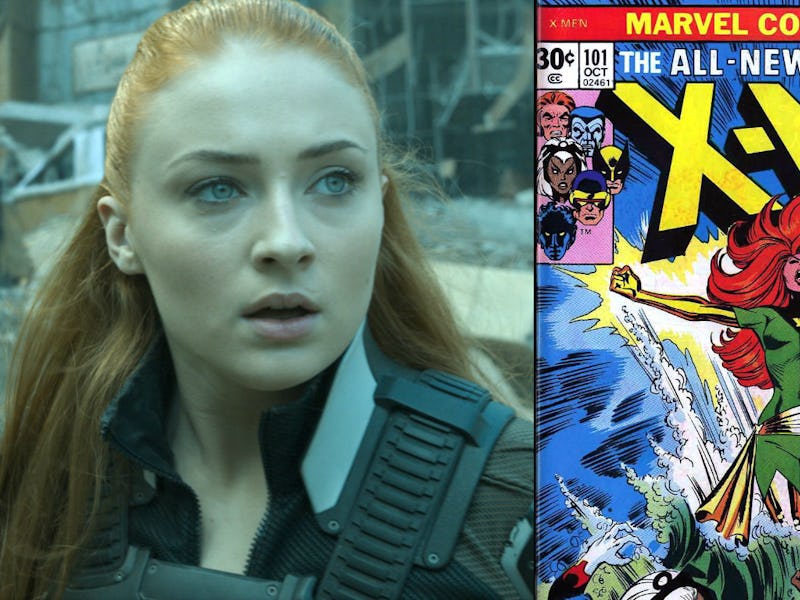Explaining Phoenix, Jean Grey's Deus Ex Machina in 'X-Men: Apocalypse'
In the end of 'X-Men: Apocalypse' Jean Grey goes berserk against En Sabah Nur. Here's why comic book fans were excited about it.

Appeasing comic-book fans has been a dominant strategy in the making of modern superhero movies. Forget coherent plots or three-dimensional characters – does the bad guy look the way Jim Lee drew him? Hardcore DC fans who defended Batman v Superman used the “it’s for fans” argument, which is bullshit when a studio spends $400 million to make a movie. At that scale, no movie is “just for fans.”
But that hasn’t stopped 20th Century Fox’s X-Men: Apocalypse, the latest in the studio’s enduring franchise with a deus ex machina ending that will leave comic book fans cheering — and general audiences scratching their heads. Directed by Bryan Singer, X-Men: Apocalypse proposes the end of the X-Men (pfft) with Oscar Isaac’s purplish personification of armageddon, En Sabah Nur, the titular Apocalypse.
As you might guess, things get grim for the X-Men as Apocalypse beats them to their knees in the climactic battle. That is, until Jean Grey (Game of Thrones star Sophie Turner, playing the teenaged character Famke Janssen played in the original trilogy) taps into the Phoenix Force and unleashes a great power that beats even Apocalypse.
Phoenix what?
The Phoenix Force. It’s the nexus of all psionic energy and exists in all entities of the multiverse (except maybe the Marvel Cinematic Universe, because even cosmic powers aren’t stronger than copyright laws). In the comics, this powerful source became connected to Jean Grey.
It wasn’t initially “cosmic” though. Introduced by writer Chris Claremont when he took over the books in the late ‘70s, Claremont began what fans today refer to as “The Phoenix Saga.” Hoping to make the first female cosmic superhero on the level of Thor, Claremeont and artist Dave Cockrum had Jean Grey endure hazardous radiation that amplified her mutant superpowers. She then adopts a new costume and codename, Phoenix, but the power soon corrupts her into a force of total destruction. For a dose of political commentary, Claremont admitted the storyline was contextually influenced by the Vietnam War, in which genocidal actions were difficult to redeem.
But hey, comics! Over time multiple writers and creatives hopped aboard, and the Phoenix turned into a cosmic, borderline mystical energy closely that’s been regularly associated with Jean Grey.
Uncanny X-Men #101, published in October 1976
So what can Jean Grey do as Phoenix?
Jean Grey keeps her telepathic and telekinetic abilities, only now they’re way stronger. She also has limitless matter manipulation, life force manipulation, cosmic awareness, and even prescience. In film, that basically translates to lots of CGI.
Has anyone else been Phoenix?
Quite a few, although the movies seem comfortable keeping Jean Grey the sole inheritor. In the Days of Future Past comic book storyline, Rachel Summers, the daughter of Jean Grey and Cyclops, inherits the Phoenix Force, and does so for a long time. In the 2012 cross-over Avengers vs. X-Men, Namor, Cyclops, Colossus, Emma Frost, and Magik inherit the powers to become the Phoenix Five. Fat chance we’ll see that in the movies, unfortunately.
Was it really a cheap ending?
Not that cheap. There was only a little build-up and foreshadowing, but Phoenix functions as a conclusion to Jean’s arc in Apocalypse. Socially isolated from the rest of Xavier’s School because of her invasive powers, Jean doesn’t have too many friends in a school populated by people who are there because they don’t have friends.
Even though Jean develops a close, borderline romantic relationship with Scott Summers (Tye Sheridan), because they were married in the comics, Phoenix confirms that, yeah, Jean is too weird and too powerful for even Xavier’s School. But the unspoken sentiment is that Xavier will find a way to teach her.
What does this mean for the ‘X-Men’ movies now?
With how wonky the X-Men timelines is, that’s hard to say. Jean Grey previously tapped into the Phoenix Force before, and died, in 2006’s X-Men III: The Last Stand. But in the continuity reset that was 2014’s X-Men: Days of Future Past, Jean Grey is alive and well (Scott Summers too!), largely implying she had yet to become Phoenix.
But now she has in Apocalypse, which is set in 1983. So did 21st Century Jean Grey master her Pheonix powers? Probably not: Bryan Singer embraces the idea of alternate timelines and multiverses. It wouldn’t be comic books if he didn’t.